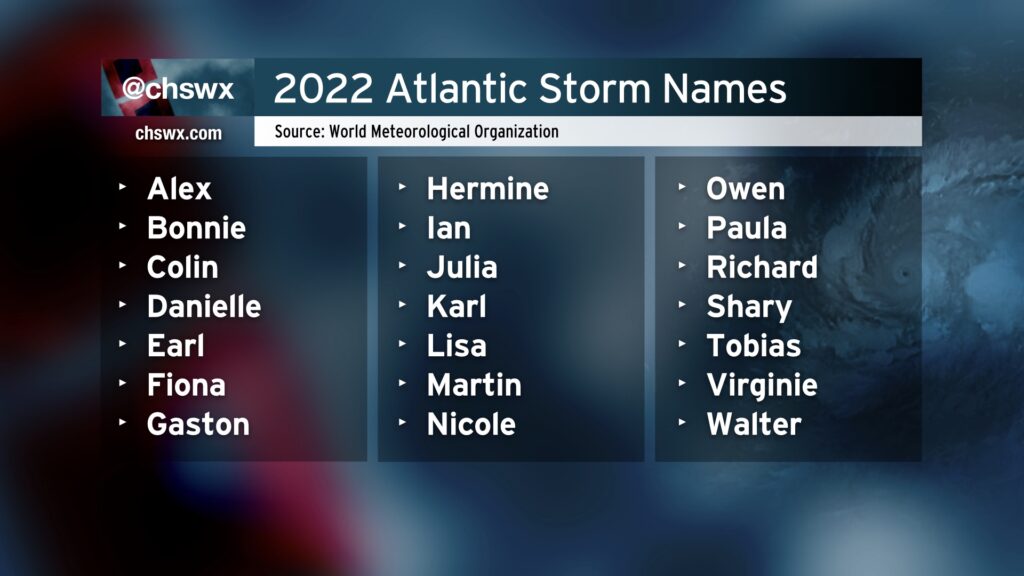Here we go again: Welcome to hurricane season

Well, friends, here we are again: It’s the first day of the Atlantic hurricane season. For the first time since 2014, we begin June with the full slate of names as there were no named May storms. (We’ll see what NHC ultimately does with low pressure that came ashore around Pensacola about a week ago in its postseason analysis, though. It looked awfully tropical.)
Another active season appears to be on tap, with both Colorado State and NOAA predicting above-average tropical activity thanks to a triple-dip La Niña, which tends to reduce wind shear in the Atlantic and make for favorable upper-air conditions for storms to develop. Sea surface temperatures in the Atlantic and Gulf are, as can be expected at this point, quite warm, too. These ingredients should be enough to churn out quite a few named storms — perhaps upwards of 20 — before it’s all said and done on November 30. Of course, when it comes down to brass tacks, none of these numbers matter all that much to anyone outside of the meteorologically inclined, because it’s all about impacts. It only takes one storm to make a hurricane season memorable for all the wrong reasons, and this is why we prepare.
We may be very close to meeting Alex, in fact. An area of disturbed weather — the remnants of former eastern Pacific Hurricane Agatha, which made landfall in Mexico this past weekend — should emerge over water later this week. When this happens, conditions look good for a tropical cyclone to develop, and NHC gives it about a 70% chance to form. This looks to be a rainmaker for South Florida and perhaps introduce some marine hazards further north in our area. (Anything beyond that remains to be seen as there are significant model differences in the northward extent of the track.)
Some general advice for getting through hurricane season
Hurricane season is a fact of life in the Lowcountry. Yes, we are vulnerable, and some may even say that we are due; our last direct hit from a major hurricane remains Hugo in 1989. It’s important that we all do what we can to get prepared, because luck eventually does run out. Here’s a few things to do to make sure your hurricane season is a smooth one.
- Check your insurance policies now, when there aren’t storms brewing. It gets a lot more difficult to deal with insurance (perhaps understating it!) when storms are bearing down.
- Buy some supplies a little at a time with routine grocery runs. Supply chains remain constrained due to ongoing effects from the COVID-19 pandemic and high fuel prices. In normal times, it can be difficult to find supplies when a storm is threatening; in these times, it can be downright impossible. Buying a little at a time not only reduces your exposure to potential supply issues, but it also keeps some of the sticker shock in check, too. Check out the South Carolina Hurricane Guide for a disaster supplies list.
- Know Your Zone. Being aware of your evacuation zone and applicable routes well ahead of any storm will save lots of heartache and help you get to safety in a sane, orderly way if the call to evacuate comes.
- Rely on weather sources that leverage the official National Hurricane Center forecast, please, and only make decisions based off said forecast. Let’s face it: widely-available computer model data on the Internet is a cat that refuses to return to its bag. It can be tempting to try to look at these models to get a jump on the forecast, but please resist this urge. The National Hurricane Center forecasters are the best of the best. There’s a reason that every reputable weather source defers to their expertise. Use that forecast and the advice of local officials to guide your decision-making, not a rando posting Scary Model Runs because it gets them likes and shares on Facebook. (And don’t be that guy that spreads those Scary Model Runs, either. Share the official forecast far and wide, because that’s less conjecture and more actionable in general.)
- Stay vigilant, but live your life, too. Yes, it’s good to keep an eye on how things are going in the tropics, but you are fortunate to be living in a place that’s jam-packed with professionals that have a lot of experience with this stuff. Put simply, the weather enterprise here in the Lowcountry has got your back. If there’s a legitimate threat, broadcast meteorologists, the local National Weather Service office, this site, and others in the enterprise (such as emergency managers) will spring into action. Lean on this experience!
- Finally, review the South Carolina Hurricane Guide at hurricane.sc. The South Carolina Emergency Management Division (SCEMD) put together this phenomenal website ahead of last season, and it’s been refreshed for 2022. It’s chock-full of actionable, valuable information, and is an indispensable resource for long-time residents and new arrivals alike.
Heed this advice, and you’re going to be just fine.
Hurricane season runs until November 30. I — and the rest of us in #chswx — will be with you every step of the way.